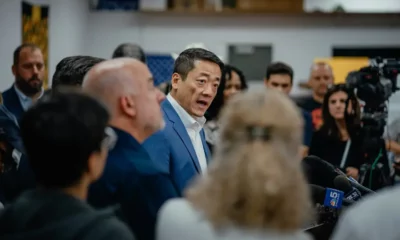News from the South - Florida News Feed
DeSantis disses Donalds, touts First Lady, when asked about 2026 governor race
ICE lets local officials stop immigrants on the streets as task force program is back
by Tim Henderson, Louisiana Illuminator
February 24, 2025
As the Trump administration pushes for more deportations, the government has revived a long-abandoned program that lets local and state law enforcement challenge people on the street about immigration status — and possibly arrest them for deportation.
So far, state and county agencies in Florida, Idaho, Kansas, Oklahoma and Texas have already signed up for the “task force” program that was dropped in 2012 after abuses including racial profiling were discovered, costing tens of millions in lawsuits. New Hampshire State Police will sign an agreement soon.
A webpage for U.S. Immigration and Customs Enforcement noted 11 new agreements with agencies in five states between Feb. 17 and Feb. 19 for the controversial program. The program, known at ICE as its “task force model,” allows local law enforcement officers to challenge people on immigration status in the course of routine police work.
Agreements were shown for Florida’s state highway patrol and the St. Lucie County Sheriff’s Office, Idaho’s Owyhee County Sheriff’s Office, the Kansas Bureau of Investigation, three Oklahoma state agencies (the Department of Public Safety, Bureau of Investigation and the Bureau of Narcotics), the Texas attorney general’s office and sheriffs in Douglas County, Nevada, and the Texas counties of Goliad and Smith.
The task force agreements with ICE were discontinued in 2012 during the Obama administration after a 2011 Department of Justice investigation found widespread racial profiling and other discrimination against Latinos in an Arizona task force.
New agreements
The new task force agreements also are separate from other so-called 287(g) cooperation agreements that allow local sheriffs or police departments to help with investigations of people already arrested and booked into local jails.
The task force model goes further, with ICE describing it as a “force multiplier.” The federal agency trains and supervises local officers so they can arrest people for immigration violations during their day-to-day duties.
Florida was the first state to sign a Trump-era task force agreement for its state police agency, on Feb. 17, according to the site. Republican Gov. Ron DeSantis announced more agreements Feb. 19. Other state agencies will participate in challenging people on immigration status: The Florida Office of Agricultural Law Enforcement, which inspects produce entering and leaving the state, has already signed an agreement, DeSantis said.
He said other state agencies will follow with task force agreements: the Department of Law Enforcement, which helps local police investigate crimes and guards the state Capitol; the Fish and Wildlife Conservation Commission, which patrols forests and waterways; and the State Guard, a volunteer military-type response agency that DeSantis reactivated in 2022.
“Our state law enforcement officers will finally be able to cooperate” not only through ICE arrests at local jails but also through the new agreements that give “expanded power and authority to interrogate any suspected alien or person believed to be an alien as of their right to be in the United States,” DeSantis said at a news conference earlier this month.
Elsewhere the Kansas Bureau of Investigation, which helps local police investigate crimes, announced its agreement Feb. 17. Director Tony Mattivi, in a news release, said the new powers would be “another tool to get known criminal offenders out of our community,” adding that his agents would focus on violent crimes, crimes against children and organized drug trafficking.
Oklahoma Gov. Kevin Stitt announced the agreement Feb. 21; it was signed Feb. 18. In a statement, Public Safety Commissioner Tim Tipton said the task force will focus on “those who threaten public safety.”
‘We promised a mass deportation’
Immigrant advocates in Florida see danger in the task force interrogations for both immigrants and localities, such as the St. Lucie County Sheriff’s Office, that decide to enlist in the program.
“They’re going to stop somebody for a routine traffic violation or loitering and ask about immigration status,” said Thomas Kennedy, a policy consultant for the Florida Immigrant Coalition, which represents 83 immigrant advocacy groups in the state.
“That’s bad for civil rights, it’s bad for our community, for trust between law enforcement and the community, for the reporting of crimes. But it also exposes municipalities and police departments to litigation,” Kennedy said.
In Arizona, Maricopa County was forced to pay $43 million in litigation fees from lawsuits before ICE stopped its task force partnership with the county in 2009. The fallout from a 2013 federal court finding of racial profiling is expected to boost taxpayer costs to $314 million this year.
Trump’s border czar, Tom Homan, met with sheriffs at a February conference in Washington, D.C., and encouraged them to “help us on the street” by participating in the 287(g) task force program.
Homan told sheriffs he’s working to lower costs for their participation by cutting the training period for deputies from four weeks to about one week, and lowering legal liability costs with what he called “full-scale indemnification.” “If you get sued, the department [of Homeland Security] will help you out and defend you,” he said, getting applause from sheriffs in the audience.
It’s bad for our community, for trust between law enforcement and the community, for the reporting of crimes.
– Thomas Kennedy, Florida Immigrant Coalition policy consultant
It’s hard to say how many immigration arrests and deportations might result from the revived task forces. Local officers trained for task force agreements are generally busy with other patrol tasks. A 2011 report by the Migration Policy Institute — based on 2010 data, when there were 37 task force agreements in 18 states — found that task forces generated far fewer arrests than automated fingerprint scanning in local jails.
The task force agreements can also generate community controversy, as they did in Prince William County, Virginia, in 2007, when police at first screened anyone they detained on the street for immigration status. That policy led to “widespread fear and panic in the immigrant community,” according to the report.
In response, the county changed its policy to investigate immigration status only after arresting and booking at the local jail, the report noted.
While many state leaders said they plan to focus on dangerous criminals who also are living in the U.S. illegally, Homan said at the conference that others may be deported simply for immigration crimes.
“We promised a mass deportation and that’s exactly what we’re going to do,” Homan told sheriffs. “People are saying, ‘Oh my God, you said you were going to concentrate just on criminals.’ Yeah, that’s what we’re going to prioritize, but if you’re not in this country legally, you got a problem. You’re not off the table.”
YOU MAKE OUR WORK POSSIBLE.
This report was first published by Stateline, part of the States Newsroom nonprofit news network. It’s supported by grants and a coalition of donors as a 501c(3) public charity. Stateline maintains editorial independence. Contact Editor Scott S. Greenberger for questions: info@stateline.org.
Louisiana Illuminator is part of States Newsroom, a nonprofit news network supported by grants and a coalition of donors as a 501c(3) public charity. Louisiana Illuminator maintains editorial independence. Contact Editor Greg LaRose for questions: info@lailluminator.com.
The post DeSantis disses Donalds, touts First Lady, when asked about 2026 governor race appeared first on floridaphoenix.com
News from the South - Florida News Feed
Hundreds cheer Arizona Sen. Ruben Gallego as Democrats take offensive against Trump’s tax bill
SUMMARY: Sen. Ruben Gallego, a first-term Arizona Democrat, energized a crowd of 300 in Davenport, Iowa, opposing the Republican-backed tax and spending bill signed by President Trump, calling it detrimental to Americans’ health and wealth. Democrats, frustrated with Trump’s policies, are mobilizing against the bill, especially its Medicaid cuts and work requirements. Unlike some Republicans avoiding public meetings, Democrats are actively campaigning in competitive Republican districts ahead of the 2026 midterms. The bill is widely seen as favoring the wealthy and hurting low-income people. Progressive figures like Alexandria Ocasio-Cortez and Bernie Sanders are also rallying opposition to the legislation nationwide.
The post Hundreds cheer Arizona Sen. Ruben Gallego as Democrats take offensive against Trump’s tax bill appeared first on www.news4jax.com
News from the South - Florida News Feed
Israel faces growing global condemnation over military expansion in Gaza
SUMMARY: International condemnation mounted over Israel’s military takeover of Gaza City amid 22 months of conflict. Health officials reported 11 Palestinians shot while seeking aid and 11 more adults dying from malnutrition within 24 hours. U.S. envoy Steve Witkoff met Qatar’s prime minister to discuss a ceasefire proposal involving hostage release and Israeli withdrawal. Hostage families pressured Israel, fearing for 50 hostages’ lives. Nine countries strongly opposed Israel’s operation, citing humanitarian risks and international law violations. Aid drops continued but were criticized as insufficient and hazardous. Gaza’s Health Ministry reported 114 adult malnutrition deaths since June, highlighting the severe humanitarian crisis.
The post Israel faces growing global condemnation over military expansion in Gaza appeared first on www.clickorlando.com
News from the South - Florida News Feed
Scattered storms expected this weekend in South Florida. Next Weather team shows timeline.
SUMMARY: Scattered storms are expected this weekend in South Florida, with on-and-off showers and thunderstorms throughout Saturday. Rain is currently affecting areas like Pompano Beach, Fort Lauderdale, Hollywood, and parts of the Keys, causing slick roads and hazardous conditions. Temperatures remain cooler due to cloud cover and rain, with highs in the low 80s to mid-80s and heat indices below 100. Rain chances will increase in the afternoon and evening, continuing into Sunday with scattered showers decreasing by late day. A moderate rip current risk makes beach activities unsafe. Tropical activity is being monitored, with two Atlantic waves showing low to medium development potential.
It is already a soggy start to our Saturday with showers rolling across parts of South Florida
For video licensing inquiries, contact: licensing@veritone.com
-
Mississippi Today5 days ago
After 30 years in prison, Mississippi woman dies from cancer she says was preventable
-
News from the South - Texas News Feed5 days ago
Texas redistricting: What to know about Dems’ quorum break
-
News from the South - Georgia News Feed7 days ago
Woman charged after boy in state’s custody dies in hot car
-
News from the South - North Carolina News Feed3 days ago
Two people unaccounted for in Spring Lake after flash flooding
-
News from the South - Florida News Feed6 days ago
Warning for social media shoppers after $22K RV scam
-
News from the South - Georgia News Feed6 days ago
Georgia lawmakers to return this winter to Capitol chambers refreshed with 19th Century details
-
News from the South - North Carolina News Feed7 days ago
Chapel Hill family starts nonprofit after twin daughters diagnosed with rare disease
-
News from the South - Arkansas News Feed6 days ago
Op-Ed: U.S. District Court rightfully blocked Arkansas’ PBM ban | Opinion








































